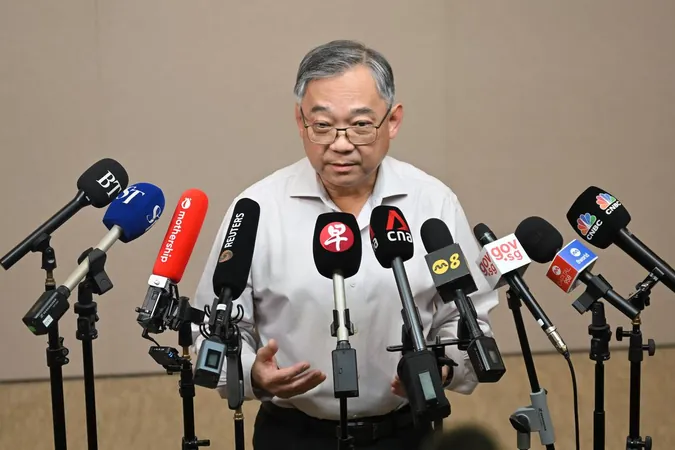
US Tariffs Spark Fears of Global Trade War: Singapore's Economic Outlook at Risk, Warns DPM Gan
2025-04-03
Author: Wei Ling
US Tariffs and Their Implications
SINGAPORE – The recent decision by the United States to impose sweeping tariffs on imported goods could have far-reaching consequences for Singapore, escalating tensions that may lead to a global trade war, according to Deputy Prime Minister and Minister for Trade and Industry, Gan Kim Yong, speaking on April 3.
DPM Gan voiced concerns following US President Donald Trump’s implementation of a 10 percent tariff on the majority of goods imported from Singapore and other key trading partners, alongside even higher tariffs for numerous other nations. Experts warn that this aggressive move could trigger retaliatory actions and disrupt global economic stability.
Economic Pressures Ahead
“This baseline tariff of 10 percent on Singaporean goods will undoubtedly exert significant pressure on our economy,” DPM Gan stated. “Both households and businesses must brace themselves for challenging times ahead.”
In light of these developments, Singapore is actively reevaluating its growth projections for 2025. DPM Gan assured the public that the government stands ready to provide necessary support to mitigate potential economic disruptions.
Assessing the Tariff Impact
“We are in the early stages of assessing the full implications of these tariffs,” he explained. “As more information emerges, we will adjust our economic forecasts accordingly.”
Although the specific tariff on Singaporean imports is comparatively lower than those on goods from some other countries, it will still negatively influence growth if global trade experiences prolonged slowdowns, DPM Gan cautioned. He noted that several nations have already begun implementing their own retaliatory tariffs in response.
The Risk of a Global Trade War
“If this cycle of retaliation continues, we may very well face a full-blown global trade war,” he warned, emphasizing the profound ramifications such a scenario could have on the global economy—disrupting trade flows, stressing supply chains, and eroding both business and consumer confidence. Investment activity could also experience a significant downturn, likely leading to long-lasting negative effects on Singapore's economic prospects.
DPM Gan expressed Singapore's disappointment regarding the US's tariff decision, highlighting the longstanding economic partnership between the two nations, which has been governed by a robust free trade agreement (FTA). He confirmed that Singapore is seeking dialogue with US officials to comprehend the basis for the tariffs and to resolve any misunderstandings surrounding the recent decisions.
Engagement and Collaboration
“The US-Singapore FTA has substantially benefited both parties, and the US has enjoyed a healthy trade surplus with Singapore, amounting to approximately $30 billion over the past two decades,” he noted. “Our disappointment is expected given this context.”
While Singapore retains the option to take retaliatory measures through the FTA framework, DPM Gan indicated that such actions could raise costs for consumers and businesses throughout Singapore. Instead, the government intends to engage constructively with US counterparts to jointly navigate these challenges.
Maintaining an Open Economy
To mitigate the potential fallout, Singapore will intensify its commitment to maintaining an open economy and advocating for free trade among like-minded nations. Currently, the Republic participates in 27 free trade agreements, which provide vital opportunities for local businesses to expand internationally.
"We will also collaborate with our trade partners within the ASEAN framework to keep our economies thriving amid this uncertainty," DPM Gan added. "ASEAN is an ideal platform to discuss strategies for integration and support, especially considering potential disruptions caused by the tariffs."
Global Cooperation and the Future
Simultaneously, Singapore is dedicated to aligning with allies worldwide to bolster the World Trade Organization and strengthen the multilateral trade system. DPM Gan emphasized, "It’s crucial for us to preserve a rules-based international trading order, which will facilitate cooperation in global commerce."
In a climate of increasing geopolitical tension and economic vulnerability, Singapore's proactive approach may be vital to weathering future challenges and securing continued growth amidst uncertainty. Will Singapore rise to the occasion, or is the nation at risk of being caught in the crossfire of a burgeoning trade conflict? Only time will tell.



 Brasil (PT)
Brasil (PT)
 Canada (EN)
Canada (EN)
 Chile (ES)
Chile (ES)
 Česko (CS)
Česko (CS)
 대한민국 (KO)
대한민국 (KO)
 España (ES)
España (ES)
 France (FR)
France (FR)
 Hong Kong (EN)
Hong Kong (EN)
 Italia (IT)
Italia (IT)
 日本 (JA)
日本 (JA)
 Magyarország (HU)
Magyarország (HU)
 Norge (NO)
Norge (NO)
 Polska (PL)
Polska (PL)
 Schweiz (DE)
Schweiz (DE)
 Singapore (EN)
Singapore (EN)
 Sverige (SV)
Sverige (SV)
 Suomi (FI)
Suomi (FI)
 Türkiye (TR)
Türkiye (TR)
 الإمارات العربية المتحدة (AR)
الإمارات العربية المتحدة (AR)